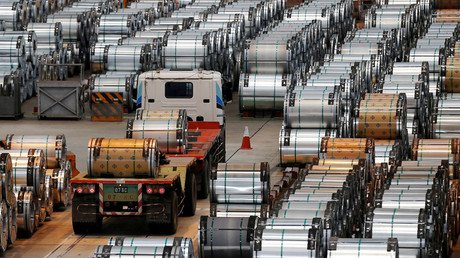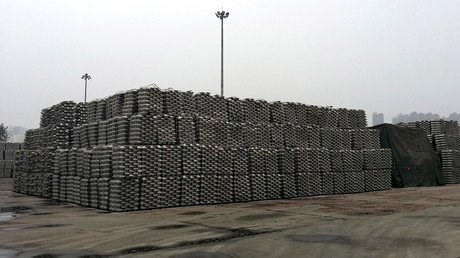China retaliates with $50 billion in tariffs on US goods

Beijing will hit 106 American products, including soybean, automobiles, and chemicals, with a 25-percent tariff in response to US levies on Chinese goods, according to the country's finance ministry.
The list of US goods affected by Chinese tariffs reportedly includes vehicles, chemicals, some types of aircraft, soybean, corn, and other agricultural products. China will also impose levies on American whisky, cigars and tobacco, some types of beef, lubricants, and propane and other plastic products.
US orange juice, certain sorghum products, cotton, some types of wheat, as well as trucks, some sport-utility vehicles, and certain electric vehicles, will also be subject to the new tariffs, according to the Chinese Finance Ministry.
The date when the new tariffs come into effect has not been announced, but the Chinese ministry said it would depend on the tariffs due to be adopted by the US.
The move comes after Washington slapped nearly 1,300 Chinese goods with 25-percent tariffs. According to the White House, the measure is aimed at curbing “unfair” trade practices. The US list includes Chinese products ranging from chemicals and diodes to motorcycles and dental devices.
Economists say there will be no winners in a trade war between the world’s two biggest economies, and it would have a significant impact on consumers.
“Without being able to buy imports at the world market price, American corporations would be at a competitive disadvantage and American consumers would have to spend more on all goods as well. That would not benefit Americans. China and other countries would lose the ability to do business with American consumers and that would be negative for them too,” Edward Stringham, president of the American Institute for Economic Research, told RT.
China is reportedly targeting goods from those US states that are considered a support base for President Donald Trump.
Why did #Beijing target US soybeans?Because #China bought $14bn worth in 2016, and 8 of 9 biggest producing states voted for Trump. @NBCNews
— Janis Mackey Frayer (@janisfrayer) April 4, 2018
According to China Director of the US Soybean Export Council Zhang Xiaoping, the decision to place tariffs on soybean imports from the United States is “regrettable” and “won't solve the trade imbalance.” Soybeans are the top US agricultural export to the Chinese market. However, the step was not unexpected for the industry, he told Reuters.
The response by China is dragging down global stock markets and commodities. Major European indices are down as much as one percent with US stock futures dropping over two percent. Soybean futures have plunged 3.7 percent, while the US dollar and the Chinese yuan are extending early losses.
For more stories on economy & finance visit RT's business section















